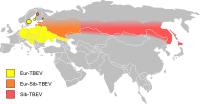Tick-Borne Encephalitis

Tick-borne encephalitis is caused by an arbovirus of the Flaviviridae family (tick-borne encephalitis virus, TBEV), transmitted principally by the bite of the Ixodes ricinus tick. The symptomology is biphasic, with the initial phase being associated with a flu-like illness and the second phase (occurring in less than 10% of patients) with symptoms of meningitis or, more rarely, meningoencephalitis.
Epidemiology
Endemic zones (natural foci) include most European countries. In these natural foci, less than 1% of ticks carry the TBEV.
Management and treatment
Treatment is symptomatic. Vaccination of individuals at increased risk of infection (forests of Central Europe) and early administration of immunoglobulin may prevent development of the disease.
Prognosis
Mortality is between 1 and 2%. Sequelae (such as headaches, paralysis, vertigo or sensorial problems) may persist for several months.